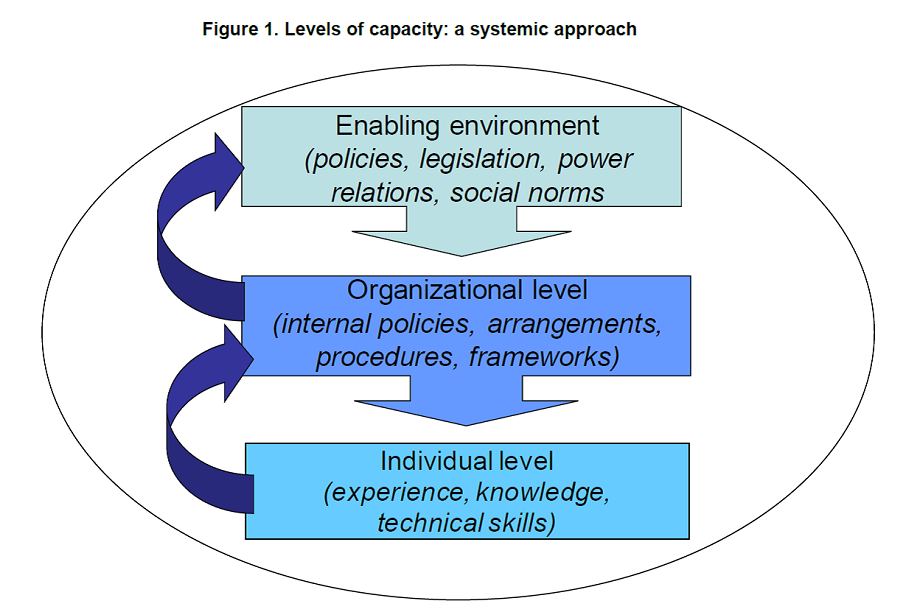Approach to capacity development
The EU-SPS approach to supporting capacity development
The ground experience and research have led to increasingly clear insights on what is conducive or detrimental to capacity development. Findings suggest what works is a ‘best fit’ rather than a ‘best practice’. Best fit does not imply a one-size-fits-all formula. Instead, it is anchored in a number of action-oriented basic principles for capacity development. The EU-SPS programme approach to supporting capacity development was based on the following principles:
- Respect national ownership (an ability to make informed choices and decisions)
- Address power relations, mindsets, behaviour change. Emphasize motivation as a driver of change.
- Capacity development is a long-term process. It can be promoted through a combination of shorter-term results that are driven from the outside and more sustainable, longer-term ones that are driven from the inside.
- Comprehensive approach linking the enabling environment, organizations and individuals
- Look beyond individual skills and focus on training to address broader questions of institutional change, leadership, empowerment and public participation.
- Use national systems, not just national plans and expertise. Discourage stand-alone project implementation units bypassing the permanent national systems of capacity development
- Adapt to local conditions and start from the specific requirements and performance expectations of the partner organization. There are no blueprints.
- Make the links to broader reforms, e.g. in education, civil service wage structures, government revenue, inclusive economy.
- Monitor capacity development systematically, using quantitative and qualitative data, keeping in mind also the unintended consequences
Defining Capacity Development in the EU-SPS
The EU-SPS defined capacity development as ‘the process through which individuals, organizations and societies obtain, strengthen and maintain the capabilities to set and achieve their own development objectives over time’.
Over the years, the development literature and agencies have often used the terms capacity development and capacity building interchangeably. The EU-SPS preferred to use the term capacity development which is more comprehensive. This choice also implies that there are always some capacities that already exist in every context. The existing base of capacities was the most important starting point.
There is often a time lag between capacity development support, the emergence of new or stronger capacities and performance improvements. The building of individual skills may take many years and societal transformation may take generations. Capacity development should therefore be seen as a long-term process whose outcomes may not evolve in a controlled and linear way.
Interrelated levels of capacity
The EU-SPS definition of capacity development reflected the viewpoint that capacity resides within individuals as well as at the level of organizations and within the enabling environment. In the literature on capacity development the organizational level is occasionally called the institutional level and the enabling environment is sometimes called the institutional or societal level. Differences in language can reflect nuances in how capacity is understood but they do not challenge the idea that capacity exists at different levels which form an integrated system. This inter-relatedness implies that any effort to assess or develop capacity necessarily needs to take into account capacity at each level, otherwise it becomes skewed or ineffective.
The three interrelated levels of capacity are:
- The enabling environment: the broader system within which individuals and organisations function and one that facilitates or hampers their existence and performance. Capacities at this level include policies, legislation, power relations and social norms. They all govern the mandates, priorities, modes of operation and civic engagement across different parts of the society.
- The organisational level: the internal policies, arrangements, procedures and frameworks that allow an organisation to operate and deliver its mandate. This emables individual capacities working together to achieve goals.
- The individual level: the skills, experience and knowledge that are vested in people. Each person is endowed with a mix of capacities that allows them to perform, whether at home, at work or in society at large. Some of these are acquired through formal training and education, others through learning by doing and experience.

More information:
UNDP Practice Note: Capacity Development (2008)



